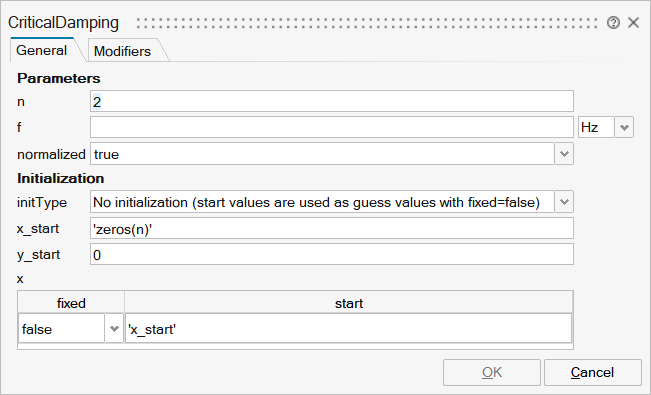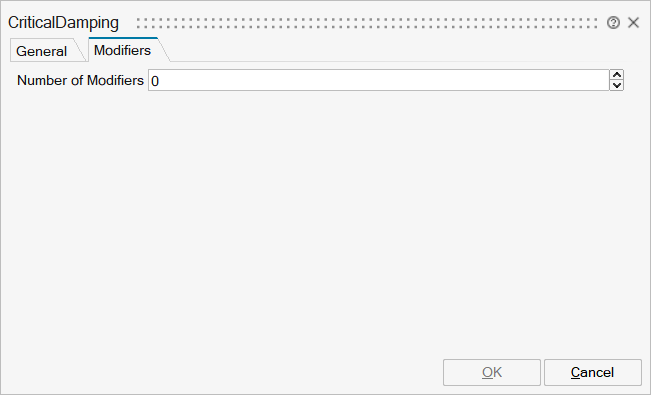CriticalDamping
Output the input signal filtered with an n-th order filter with critical damping
![]()
Library
Modelica/Blocks/Continuous
Description
This block defines the transfer function between theinput u and the output yas an n-th order filter with critical dampingcharacteristics and cut-off frequency f. It isimplemented as a series of first order filters.This filter type is especially useful to filter the input of aninverse model, since the filter does not introduce any transients.
If parameter normalized = true (default), the filteris normalized such that the amplitude of the filter transfer functionat the cut-off frequency f is 1/sqrt(2) (= 3 dB). Otherwise, the filteris not normalized, i.e., it is unmodified. A normalized filter is usuallymuch better for applications, since filters of different orders are"comparable", whereas non-normalized filters usually require to adapt thecut-off frequency, when the order of the filter is changed.Figures of the filter step responses are shown below.Note, in versions before version 3.0 of the Modelica Standard library,the CriticalDamping filter was provided only in non-normalized form.
If transients at the simulation start shall be avoided, the filtershould be initialized in steady state (e.g., using optioninitType=Modelica.Blocks.Types.Init.SteadyState).
The critical damping filter is defined as
α = if normalized then sqrt(2^(1/n) - 1) else 1 // frequency correction factorω = 2*π*f/α 1y = ------------- * u (s/w + 1)^n


Parameters

| Name | Label | Description | Data Type | Valid Values |
|---|---|---|---|---|
mo_n | n | Order of filter | Scalar | |
mo_f | f | Cut-off frequency | Scalar | |
mo_normalized | normalized | = true, if amplitude at f_cut is 3 dB, otherwise unmodified filter | Scalar | true |
mo_alpha | alpha | Frequency correction factor for normalized filter | Scalar | |
mo_w | w | Scalar | ||
mo_initType | initType | Type of initialization (1: no init, 2: steady state, 3: initial state, 4: initial output) | Structure | |
mo_initType/choice1 | Modelica.Blocks.Types.Init.NoInit | Number | 0 | |
mo_initType/choice2 | Modelica.Blocks.Types.Init.SteadyState | Number | 0 | |
mo_initType/choice3 | Modelica.Blocks.Types.Init.InitialState | Number | 0 | |
mo_initType/choice4 | Modelica.Blocks.Types.Init.InitialOutput | Number | 0 | |
mo_x_start | x_start | Initial or guess values of states | Vector | |
mo_y_start | y_start | Initial value of output (remaining states are in steady state) | Scalar | |
mo_x | x | x | Structure | |
mo_x/fixed | fixed | Cell of vectors | true | |
mo_x/start | start | Cell of vectors |

| Name | Label | Description | Data Type | Valid Values |
|---|---|---|---|---|
mo__nmodifiers | Number of Modifiers | Specifies the number of modifiers | Number | |
mo__modifiers | Modifiers | Add new modifier | Structure | |
mo__modifiers/varname | Variable name | Cell of strings | ||
mo__modifiers/attribute | Attribute | Cell of strings | 'start' | |
mo__modifiers/value | Value |
Ports
| Name | Type | Description | IO Type | Number |
|---|---|---|---|---|
u | implicit | Connector of Real input signal | input | 1 |
y | implicit | Connector of Real output signal | output | 1 |